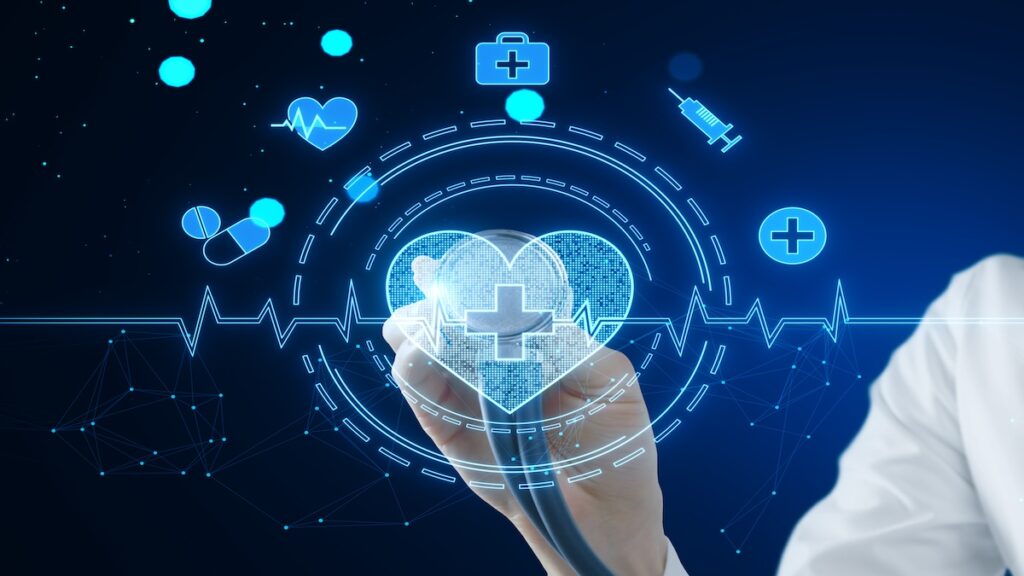Artificial Intelligence (AI) has emerged as a transformative force in the healthcare industry, revolutionizing how medical services are delivered and managed. Leveraging AI, healthcare providers can streamline processes, enhance patient care, and improve overall efficiency. In this article, we will explore ten remarkable benefits that AI brings to the healthcare sector.
1. Enhanced Diagnosis and Early Detection
AI’s ability to process vast amounts of medical data swiftly has significantly improved the accuracy and speed of diagnosis. AI algorithms can analyze medical images, such as X-rays and MRIs, with unparalleled precision, leading to faster and more reliable diagnoses. Moreover, AI systems can detect subtle patterns and anomalies in patient data, contributing to early disease detection. For instance, AI-driven tools can identify markers of chronic diseases like diabetes or cancer in their early stages, enabling timely interventions and treatments, ultimately saving lives and improving patient outcomes.
2. Personalized Treatment Plans
AI has brought the concept of personalized medicine to the forefront. By analyzing a patient’s medical history, genetics, and current health status, AI can generate personalized treatment plans tailored to individual needs. These plans consider genetic predispositions, drug interactions, and other factors affecting treatment response, enhancing therapy effectiveness and reducing adverse reactions. Personalized treatment maximizes recovery chances, making this vision a reality through AI.
3. Predictive Analytics for Disease Prevention
AI is a powerful tool in predicting disease outbreaks and identifying potential health risks within populations. By analyzing vast datasets, including health records and environmental data, AI can detect trends and patterns that may signal an impending health crisis. For example, during the COVID-19 pandemic, AI models predicted virus spread and resource allocation, helping authorities make informed decisions and mitigate impact. AI also forecasts chronic illness progression in individuals, enabling preventive measures and reducing healthcare system burdens.
4. Efficient Medical Imaging Analysis
AI algorithms can analyze complex medical images with remarkable speed and accuracy, assisting radiologists and pathologists in interpreting these images. This collaborative approach accelerates the diagnostic process, reduces oversight chances, and ensures timely patient care. AI also identifies patterns and trends in medical imaging data, advancing disease understanding and improving treatment strategies.

5. Streamlined Administrative Tasks
AI-driven automation streamlines administrative tasks, reducing workload and minimizing errors. Chatbots and virtual assistants handle appointment scheduling and frequently asked questions, freeing up human staff for complex tasks. AI-powered software processes insurance claims quickly and accurately, reducing disputes and delays. By automating administrative tasks, AI allows healthcare professionals to focus more on patient care, improving overall efficiency and patient experience.
6. Drug Discovery and Development
AI accelerates drug discovery by analyzing vast datasets of molecular information, predicting compound effectiveness, and identifying potential side effects. This speedier process can lead to developing novel treatments, including for rare conditions. AI-driven drug development makes the process more cost-effective, reducing financial barriers and benefiting patients with innovative treatments and pharmaceutical companies with efficient market access.
7. Remote Monitoring and Telehealth
AI plays a pivotal role in enabling remote monitoring and telehealth services. With wearable devices and connected sensors, AI continuously collects and analyzes patient data remotely. This allows healthcare providers to monitor patients with chronic conditions, ensuring early issue detection. AI-driven communication platforms enable virtual consultations, increasing healthcare access and reducing in-person visits, especially important during public health crises.
8. Improved Patient Engagement
AI-driven healthcare apps and platforms actively engage patients in their healthcare journey. These apps provide access to medical records, test results, and personalized health recommendations, helping patients set goals, track progress, and receive reminders. AI analyzes patient data to offer personalized health tips, encouraging healthy behaviors. Improved patient engagement leads to informed decision-making and increased patient satisfaction, resulting in positive health outcomes.
9. Cost Reduction and Resource Optimization
AI reduces healthcare costs and optimizes resource allocation by automating administrative tasks, minimizing labor needs. AI analyzes patient data to identify high-risk individuals requiring intensive interventions, enabling early preventive measures and reducing costly treatments. AI-driven scheduling systems ensure efficient use of medical staff and equipment, minimizing wait times and reducing resource wastage. These capabilities make healthcare more affordable and accessible, improving the overall healthcare ecosystem.
10. Facilitating Medical Research and Enhancing Medical Education
AI accelerates medical research by analyzing vast datasets, identifying trends, patterns, and potential breakthroughs. AI identifies potential drug candidates, expedites drug discovery, and assists in clinical trial recruitment, benefiting rare disease research. AI-powered tools and simulations enhance medical education, offering immersive learning experiences. AI-driven chatbots and virtual assistants provide instant knowledge access, promoting continuous learning and ensuring healthcare providers stay up-to-date with developments.
Conclusion
The integration of AI into healthcare has ushered in a new era of possibilities, transforming diagnosis, treatment, administrative tasks, and research. AI streamlines processes, enhances patient care, and improves overall efficiency, promising a healthier and more prosperous future. Embracing AI advancements is essential for providing high-quality, accessible, and personalized healthcare for all. Stay tuned for the continued evolution of AI in healthcare, shaping a brighter future for individuals and communities worldwide.




